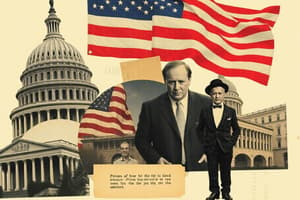Podcast
Questions and Answers
Which of the following scenarios would LEAST likely fall under Congress's power to regulate commerce?
Which of the following scenarios would LEAST likely fall under Congress's power to regulate commerce?
- Prohibiting discrimination by hotels that serve interstate travelers.
- Establishing safety standards for interstate railways.
- Regulating the shipment of goods across state lines.
- Setting speed limits on purely local streets. (correct)
Under what condition(s) can Congress regulate intrastate commerce?
Under what condition(s) can Congress regulate intrastate commerce?
- If the intrastate commerce has a substantial impact on interstate commerce, or if totally intrastate activities can be aggregated and have an impact on interstate activity. (correct)
- Only if the activity involves non-economic behavior.
- Only if the activity directly involves the use of federal funds.
- Never, as intrastate commerce is reserved solely for state regulation.
If a state and federal law conflict on a matter concerning interstate commerce, which principle generally determines which law prevails?
If a state and federal law conflict on a matter concerning interstate commerce, which principle generally determines which law prevails?
- The Supremacy Clause, where federal law prevails if the federal government has the right to regulate it. (correct)
- The Tenth Amendment, which reserves powers not delegated to the federal government to the states.
- The Necessary and Proper Clause, allowing states to enact laws necessary for their governance.
- The Commerce Clause, giving states the power to regulate commerce within their borders.
Which of the following represents a valid application of Congress's spending power?
Which of the following represents a valid application of Congress's spending power?
Under what circumstances can Congress regulate non-economic activity?
Under what circumstances can Congress regulate non-economic activity?
What is the primary limitation on Congress's ability to use the Necessary and Proper Clause?
What is the primary limitation on Congress's ability to use the Necessary and Proper Clause?
Which of the following actions by Congress would most likely violate the principles of federalism as interpreted by the Supreme Court?
Which of the following actions by Congress would most likely violate the principles of federalism as interpreted by the Supreme Court?
Which of the following scenarios best illustrates Congress exceeding its authority under the Commerce Clause?
Which of the following scenarios best illustrates Congress exceeding its authority under the Commerce Clause?
A state law imposes a tax on goods imported from other states that is higher than the tax on similar goods produced within the state. Which constitutional principle does this violate?
A state law imposes a tax on goods imported from other states that is higher than the tax on similar goods produced within the state. Which constitutional principle does this violate?
What is the significance of the 'jurisdictional hook' in the context of Congress's power to regulate non-economic activity under the Commerce Clause?
What is the significance of the 'jurisdictional hook' in the context of Congress's power to regulate non-economic activity under the Commerce Clause?
Flashcards
Congressional Powers
Congressional Powers
Allows Congress to tax and spend, declare war, create legislation, engage in treaties, regulate commerce and make necessary and proper laws.
Regulation of Commerce
Regulation of Commerce
Congress can regulate interstate commerce, including activities with a substantial impact on it; intrastate commerce can be regulated if it impacts interstate commerce. Non-economic activity only if there is a jurisdictional hook.
Taxing vs. Spending Power
Taxing vs. Spending Power
Congress cannot use its taxing power as a penalty, but it can provide incentives to states through spending to encourage certain behaviors.
10th Amendment
10th Amendment
Signup and view all the flashcards
Supremacy Clause
Supremacy Clause
Signup and view all the flashcards
Necessary and Proper Clause
Necessary and Proper Clause
Signup and view all the flashcards
Federal Mandates
Federal Mandates
Signup and view all the flashcards
Commerce Clause Regulation
Commerce Clause Regulation
Signup and view all the flashcards
Regulation of Non-Economic Activity
Regulation of Non-Economic Activity
Signup and view all the flashcards
Regulation on Inactivity
Regulation on Inactivity
Signup and view all the flashcards
Study Notes
Congressional Powers
- Congress can tax, spend, declare war, create legislation and treaties.
- Congress has the power to regulate commerce and enact laws that are necessary and proper to execute its powers.
- Congress cannot regulate intrastate commerce unless it has a substantial impact on interstate commerce.
- Congress can regulate intrastate activities if they can be aggregated to have an impact on interstate activity.
- Congress cannot regulate non-economic activity unless it has a substantial impact on interstate commerce with a jurisdictional hook.
- Non-economic activity cannot be aggregated.
- Congress cannot use taxation as a penalty.
- Congress can encourage states to act a certain way through spending power incentives, but cannot compel behavior directly.
- Congress can spend to provide for general welfare.
- The 10th Amendment grants Congress powers not delegated to the states.
- Congress cannot regulate purely local activities.
- States cannot discriminate against other states with interstate commerce.
- The Supremacy Clause dictates that when state and federal law conflict, federal law prevails if the federal government has the right to regulate the matter.
- States can regulate a subject if there is no federal law on it, provided it doesn't interfere with interstate commerce.
Necessary and Proper Clause
- Must be tied to an enumerated power.
- Non-economic activities cannot be aggregated, to avoid broadening the commerce clause power too far.
- Economy encompasses production, distribution, and consumption.
10th Amendment
- Garcia rejects that the 10th amendment gives states untouchable autonomy.
- Congress cannot compel states to act as a federal actor or implement congressional legislation.
- Congress can encourage states to act by providing more funding.
Approaching Exam Questions
- Check if Congress is using an enumerated power, focusing on the commerce clause, taxing, and spending.
- Determine if Congress can regulate through the Commerce Clause.
- Consider channels and instrumentalities; if neither apply, assess the substantial effects test (economic vs. non-economic).
- If economic (consumption, production, distribution), aggregation can be used to argue that effects on interstate commerce exist.
- Non-economic activity cannot be aggregated.
- If the activity is non-economic, look for a traditional hook (e.g., possessed or traveled in interstate commerce).
- Assess whether it interferes with other constitutional rights, which is not allowed.
- If under taxing and spending, consider the Dole factors (spending program, for general welfare, and if it is a penalty).
- Congress cannot regulate inactivity to compel a purchase.
Studying That Suits You
Use AI to generate personalized quizzes and flashcards to suit your learning preferences.




